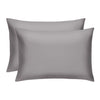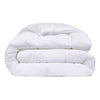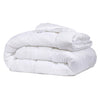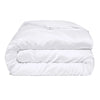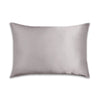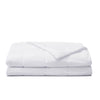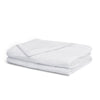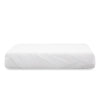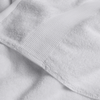The Daily Miracle
What's The Difference Between Antibacterial And Antimicrobial
Published
June 04, 2021
Author
Nicholas Crusie

How do the invisible organisms living all around us affect our health and our sleep?
How do the invisible organisms living all around us affect our health and our sleep? You know it’s a good idea to use sanitizer after touching public transport and wash your hands after using the bathroom, but perhaps you’ve also been told that a bit of dirt can boost your immune system and keep you feeling healthy.
Knowing what microbes are and how they affect us is the first step to understanding which ones are harmless (or even beneficial) and how to effectively ward off those that pose a danger.
Microbes and Bacteria – What Exactly Are They?
If the past year and a half have taught us anything, it should be what a virus is and how to get rid of it. However, we still seem to be confused between viruses, bacteria, and the like. How many times have you bought a pack of antibacterial wipes to stave off the invisible virus that could strike at any moment? The truth is, while antibacterial wipes or hand soap will keep you clean, they won’t do anything for a viral infection.
Bacteria and viruses are two classifications of microbes. The way they operate is different, meaning ways to kill them are too! The same can be said vice versa. It is important to know the difference between antibacterial and antimicrobial to better understand the germs we interact with on a daily basis and how to avoid them.
Microbes and Antimicrobial
A microbe (or microorganism) is an umbrella term that includes bacteria, archaea, protozoa, algae, fungi, viruses, and multicellular animal parasites. These tiny organisms are as diverse as life on earth and are often crucial to our survival—no wonder the word is partially derived from the Greek word bios, meaning life! In fact, our microbiomes – microbes found inside our bodies – protect us from outside germs and keep our immune system functioning so we don’t get severely ill.
However, some microbes can be dangerous to human health, like the viral microbe that may cause coronavirus or the bacterium microbe that causes tuberculosis. We tend to call harmful microbes pathogens or germs interchangeably. Germs can be considered as invaders that can alter the healthy balance in our bodies that ‘good’ microbes help maintain.
Antimicrobial products reduce or eliminate the specific microbes their ingredients target. For example, sanitizers with ethanol or isopropyl alcohol mainly kill bacteria found on surfaces.
On the other hand, disinfectants including chlorine compounds can eliminate more than one type of microbe; bacteria, fungi, and viruses.
Antimicrobial additives are an important development in the fight against harmful microbes. Additives such as silver ions can prevent 99.9% of bacterial growth for the lifetime of the product. What’s more, silver is naturally antimicrobial and is not toxic to human health like some harsh antimicrobial chemicals are.
Bacteria and Antibacterial
Bacteria is the most common microorganism humans interact with daily. It is a single-celled microbe that has been around for billions of years. There are an estimated five nonillion bacteria on earth – some good and some bad.
Antibacterial products contain disinfecting or sterilizing ingredients that target and eliminate bacteria by preventing bacteria cells from multiplying or by breaking down the bacterial membrane – like that bottle of hand sanitizer you keep handy for public transport. Antibacterial products will not mitigate the spread of other microbes such as viruses, which need antimicrobial or specifically antiviral ingredients to do so.
Microbes and Bacteria at Home
You might be surprised to discover that microbes like bacteria are not only a threat in the outside world but have made themselves at home in your household. Microbes are sitting tight in all rooms of the house – even the laundry room! For those with allergies, bacterial and viral infections might exacerbate allergic asthma, while fungal skin infections can trigger eczema.
Common causes of bacterial buildup in the household include pets and shoe traffic from outside, festering food particles, and the dead skin cells we shed daily – yes, it’s gross! While using piping hot water in your washing cycle is the best way to kill germs, leaving wet laundry sitting in the machine creates a germ breeding ground – ruining your efforts in as little as 30 minutes.
The Miracle Sheet Solution
Miracle Sheets could be the solution to this Catch 22. Infused with pure natural silver, these premium 350-thread-count bed sheets naturally reduce bacteria as you snooze! Sleeping on bacteria-ridden sheets can trigger breakouts and allergies, but the pure silver ions weaved into Miracle Sheets connect to bacteria like a magnet, stopping 99.9% of bacterial growth before it has a chance to multiply.
The infused silver nanoparticles in the fabric also prevent odor-causing bacterial growth to keep your sheets fresher for longer - so you can reduce your laundry load! This will help you avoid those pesky germs lurking in the washing machine and will also help you save water and electricity – making these sheets a more sustainable option than regular sheets.
The peace of mind of antimicrobial sheets will certainly help you sleep better – as will the Miracle sheet’s thermoregulating technology, leading the Sleep Foundation to dub them one of the Best Cooling Sheets. Getting hot and bothered at night can cause sleep disruptions as our bodies naturally cool a couple of degrees when we are sleeping. Thermoregulating sheets will reduce the chances of this happening to you.
What’s in Your Mattress and Why Does It Matter?
What’s more, a recent study has shown that body heat can help release volatile organic compounds from your mattress that are toxic and that may have an impact on children’s health. While researchers have not found any harmful health effects yet, it is always better to be safe rather than sorry when it comes to your loved ones. The premium percale cotton Miracle Sheet Signature Set comes in three soothing shades to keep you and your family’s bedrooms looking and feeling like a clean, safe haven.
Miracle sheets will keep you feeling well-rested at night and fresh-faced in the morning – but the problem of household germs runs deeper than that. Mattresses are a hotbed of unwanted pathogens. Dead skin cells find their way into the nooks of your mattress, attracting dust mites that like to burrow in the cloth fibers holding the bacteria. What’s more, an adult sweats roughly 26 gallons a year while sleeping, making your mattress a breeding ground for moisture-loving bacteria.
It’s crucial to remember that sheets are the barrier to germs trying to invade your mattress. An ill-fitted sheet is the arch-nemesis of a good night’s sleep in more ways than one. While you wrestle with fabric, trying desperately to keep it lying flat and taught across all four corners, you are unwittingly letting in a host of invading germs. Even just changing position while you sleep can release these particles from your mattress into the air you breathe. Twice a year, you should do a DIY or professional deep clean of your mattress to keep it feeling fresh.
The Deep Pocket Solution
However, a more convenient solution for everyday life is to invest in Deep Pocket sheets. Standard sheets are typically able to cover seven to 14 inches deep, but if your mattress height is taller than 14 inches, it’s likely that making the bed is a constant battle that the mattress always wins.
Deep Pocket sheets give you enough room to accommodate thicker mattresses and toppers for extra comfort. Make sure to measure your mattress height and take extra bedding into account when choosing the right sheets for your bed for the perfect, worry-free night’s sleep.
Main Takeaways for a Clean and Comfortable Sleep!
Microbes are an umbrella term for a host of microorganisms that we coexist with. Most of these microbes are harmless – and can even be beneficial to human health. Some microbes can infect us and make us ill.
Bacteria is a microbe that is extremely common in households and that should be treated with antimicrobial products or antibacterial products, more specifically.
Bacterial and other types of germs can be found throughout the household, including in the laundry room and bedroom. There are some key tips to keep your household free of these germs that can exacerbate allergies, acne, and other irritating afflictions.
Investing in the Miracle Sheet set is an easy way to keep your bedroom extra clean and cozy. Deep Pocket style sheets will help you avoid germ buildup on your mattress and can also provide maximum comfort for the perfect night’s sleep.
Sources:
- What are microbes? | NCBI
- Defining the Human Microbiome | NCBI
- Chemical Disinfectants | CDC
- Antimicrobials Fact Sheet | NCBI
- Bacteria: Types | Medical News Today
- The 9 Dirtiest Places in Your Home | Healthline
- Best Cooling Bed Sheets of 2021 | Sleep Foundation
- Is Your Mattress Releasing Toxins While You Sleep? | WebMD
- Dirty Mattress Health Hazards | WebMD
- Characterizing particle resuspension from mattresses: | Wiley


